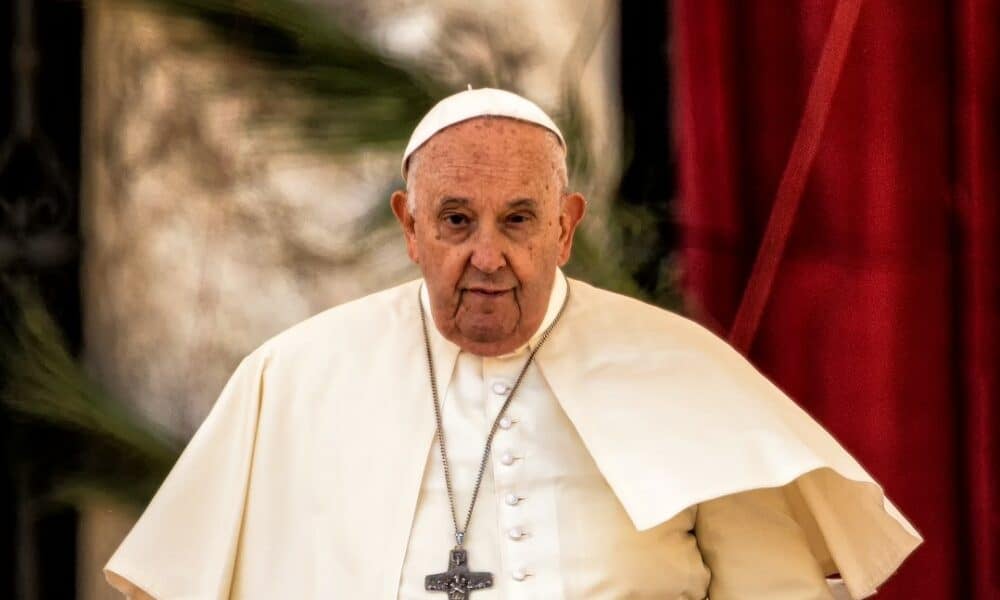Pope Francis, 88, remains hospitalized at the Agostino Gemelli Polyclinic in Rome due to a persistent case of bronchitis that requires continuous medical care. The hospitalization followed his morning audiences at Casa Santa Marta when he exhibited mild fever and worsening respiratory symptoms. With a history of previous hospitalizations, the Pope was taken to the hospital for examinations and intensive monitoring to ensure a smooth recovery. His first night in the hospital was uneventful, and the medical team reported that the Catholic Church leader responded well to treatment without an increase in fever or signs of deterioration. However, as a precaution, doctors have recommended complete rest, leading to the cancellation of key engagements in his schedule, including the traditional Sunday Angelus prayer and a planned visit to the Cinecittà film studios.
Pope Francis’ hospitalization has caused concern among the faithful, who have gathered in various locations in Rome for prayers and expressions of support. In response, the Vatican has reassured the public that, despite the need for hospitalization, the Pope’s clinical condition remains stable. He is expected to stay at the hospital until significant improvement in his respiratory condition is observed, preventing possible complications that could hinder his recovery.
In recent years, Pope Francis has faced recurring health challenges, including an abdominal hernia surgery and chronic knee problems, which often force him to use a wheelchair or cane. His current hospitalization underscores the necessity for increased medical attention to ensure the continuation of his duties as the leader of the Catholic Church.
Hospitalization at Gemelli Hospital and Pope Francis’ Medical History
The Agostino Gemelli Polyclinic is one of Italy’s most renowned hospitals and has served as the treatment center for popes over the decades. Pope John Paul II, for example, was frequently hospitalized at this facility, which has a special wing dedicated to treating popes. Pope Francis has previously been hospitalized at Gemelli on three recent occasions, the most notable being his abdominal hernia surgery in June 2023, which required a nine-day stay.
In March 2023, Francis was also hospitalized for three days due to infectious bronchitis. In July 2021, he underwent colon surgery, requiring ten days of hospitalization. These incidents highlight that despite his resilience and commitment to his ministry, the Pope’s health demands constant attention, especially given his advanced age and demanding schedule.
Impact of Hospitalization on Pope Francis’ Agenda
The Pope’s hospitalization has led to the cancellation of key scheduled events, including:
- The traditional Sunday Angelus prayer, which draws thousands of faithful to St. Peter’s Square, was suspended.
- The Jubilee audience, scheduled for February 15, was canceled, impacting Vatican programs.
- The Sunday Mass for the Jubilee of Artists, which Pope Francis was set to lead, will now be presided over by Cardinal José Tolentino de Mendonça.
- The visit to Cinecittà film studios, planned for February 17, was called off due to the medical directive for complete rest.
Faithful and Religious Leaders Express Support for Pope Francis
The Pope’s health is being closely monitored by Catholics worldwide. With his recent hospitalization, prayer groups have gathered outside Gemelli Hospital and in religious centers across different countries to pray for his recovery. On social media, thousands of believers have expressed their support, wishing him a swift recovery and the ability to resume his usual activities.
In addition to the faithful, various religious and political leaders have extended their solidarity. Cardinals and bishops from multiple nations have sent messages to the Vatican, expressing their concern and prayers for the Pope’s health. The international community is also closely following the situation, given the Pope’s central role in the Catholic Church and global diplomacy.
Medical Recommendations and the Pope’s Treatment
To ensure a full recovery, the medical team overseeing Pope Francis has implemented strict measures, including:
- Administration of specific medications to combat the respiratory infection.
- Complete rest to prevent physical strain and accelerate recovery.
- Continuous monitoring of vital signs and treatment progress.
- A balanced diet to strengthen the Pope’s immune system.
Doctors are closely evaluating how Pope Francis responds to the treatment, and there is no set discharge date at this time. The primary concern is to ensure that he is fully recovered before resuming his regular duties.
Timeline of Pope Francis’ Recent Hospitalizations
- July 2021 – Hospitalized for colon surgery, staying at Gemelli for ten days.
- March 2023 – Treated for infectious bronchitis, requiring three days of hospitalization.
- June 2023 – Underwent abdominal hernia surgery, hospitalized for nine days.
- February 2025 – Currently hospitalized for persistent bronchitis.
The Importance of Gemelli Hospital for Popes
The Agostino Gemelli Polyclinic is considered a leading medical facility in Italy and has been the chosen treatment center for popes for decades. Some key facts about the hospital include:
- It has a special wing designated for the treatment of popes.
- It was frequently used by Pope John Paul II during his hospitalizations.
- It has state-of-the-art medical infrastructure and top specialists.
- It is one of the largest hospitals in Rome, serving thousands of patients annually.
How Pope Francis’ Health Affects the Catholic Church
The Pope’s recurrent health issues have sparked discussions about his ability to continue fulfilling his responsibilities. In previous statements, Francis has acknowledged that he might consider resigning if his physical condition ever prevents him from carrying out his duties. However, he remains committed to leading the Catholic Church, adjusting his schedule as necessary to accommodate his health limitations.
The Catholic community awaits further updates on Pope Francis’ medical condition and remains hopeful for his full recovery. Meanwhile, the Vatican emphasizes that all medical decisions will be based on the well-being and safety of the Pope.

Pope Francis, 88, remains hospitalized at the Agostino Gemelli Polyclinic in Rome due to a persistent case of bronchitis that requires continuous medical care. The hospitalization followed his morning audiences at Casa Santa Marta when he exhibited mild fever and worsening respiratory symptoms. With a history of previous hospitalizations, the Pope was taken to the hospital for examinations and intensive monitoring to ensure a smooth recovery. His first night in the hospital was uneventful, and the medical team reported that the Catholic Church leader responded well to treatment without an increase in fever or signs of deterioration. However, as a precaution, doctors have recommended complete rest, leading to the cancellation of key engagements in his schedule, including the traditional Sunday Angelus prayer and a planned visit to the Cinecittà film studios.
Pope Francis’ hospitalization has caused concern among the faithful, who have gathered in various locations in Rome for prayers and expressions of support. In response, the Vatican has reassured the public that, despite the need for hospitalization, the Pope’s clinical condition remains stable. He is expected to stay at the hospital until significant improvement in his respiratory condition is observed, preventing possible complications that could hinder his recovery.
In recent years, Pope Francis has faced recurring health challenges, including an abdominal hernia surgery and chronic knee problems, which often force him to use a wheelchair or cane. His current hospitalization underscores the necessity for increased medical attention to ensure the continuation of his duties as the leader of the Catholic Church.
Hospitalization at Gemelli Hospital and Pope Francis’ Medical History
The Agostino Gemelli Polyclinic is one of Italy’s most renowned hospitals and has served as the treatment center for popes over the decades. Pope John Paul II, for example, was frequently hospitalized at this facility, which has a special wing dedicated to treating popes. Pope Francis has previously been hospitalized at Gemelli on three recent occasions, the most notable being his abdominal hernia surgery in June 2023, which required a nine-day stay.
In March 2023, Francis was also hospitalized for three days due to infectious bronchitis. In July 2021, he underwent colon surgery, requiring ten days of hospitalization. These incidents highlight that despite his resilience and commitment to his ministry, the Pope’s health demands constant attention, especially given his advanced age and demanding schedule.
Impact of Hospitalization on Pope Francis’ Agenda
The Pope’s hospitalization has led to the cancellation of key scheduled events, including:
- The traditional Sunday Angelus prayer, which draws thousands of faithful to St. Peter’s Square, was suspended.
- The Jubilee audience, scheduled for February 15, was canceled, impacting Vatican programs.
- The Sunday Mass for the Jubilee of Artists, which Pope Francis was set to lead, will now be presided over by Cardinal José Tolentino de Mendonça.
- The visit to Cinecittà film studios, planned for February 17, was called off due to the medical directive for complete rest.
Faithful and Religious Leaders Express Support for Pope Francis
The Pope’s health is being closely monitored by Catholics worldwide. With his recent hospitalization, prayer groups have gathered outside Gemelli Hospital and in religious centers across different countries to pray for his recovery. On social media, thousands of believers have expressed their support, wishing him a swift recovery and the ability to resume his usual activities.
In addition to the faithful, various religious and political leaders have extended their solidarity. Cardinals and bishops from multiple nations have sent messages to the Vatican, expressing their concern and prayers for the Pope’s health. The international community is also closely following the situation, given the Pope’s central role in the Catholic Church and global diplomacy.
Medical Recommendations and the Pope’s Treatment
To ensure a full recovery, the medical team overseeing Pope Francis has implemented strict measures, including:
- Administration of specific medications to combat the respiratory infection.
- Complete rest to prevent physical strain and accelerate recovery.
- Continuous monitoring of vital signs and treatment progress.
- A balanced diet to strengthen the Pope’s immune system.
Doctors are closely evaluating how Pope Francis responds to the treatment, and there is no set discharge date at this time. The primary concern is to ensure that he is fully recovered before resuming his regular duties.
Timeline of Pope Francis’ Recent Hospitalizations
- July 2021 – Hospitalized for colon surgery, staying at Gemelli for ten days.
- March 2023 – Treated for infectious bronchitis, requiring three days of hospitalization.
- June 2023 – Underwent abdominal hernia surgery, hospitalized for nine days.
- February 2025 – Currently hospitalized for persistent bronchitis.
The Importance of Gemelli Hospital for Popes
The Agostino Gemelli Polyclinic is considered a leading medical facility in Italy and has been the chosen treatment center for popes for decades. Some key facts about the hospital include:
- It has a special wing designated for the treatment of popes.
- It was frequently used by Pope John Paul II during his hospitalizations.
- It has state-of-the-art medical infrastructure and top specialists.
- It is one of the largest hospitals in Rome, serving thousands of patients annually.
How Pope Francis’ Health Affects the Catholic Church
The Pope’s recurrent health issues have sparked discussions about his ability to continue fulfilling his responsibilities. In previous statements, Francis has acknowledged that he might consider resigning if his physical condition ever prevents him from carrying out his duties. However, he remains committed to leading the Catholic Church, adjusting his schedule as necessary to accommodate his health limitations.
The Catholic community awaits further updates on Pope Francis’ medical condition and remains hopeful for his full recovery. Meanwhile, the Vatican emphasizes that all medical decisions will be based on the well-being and safety of the Pope.







